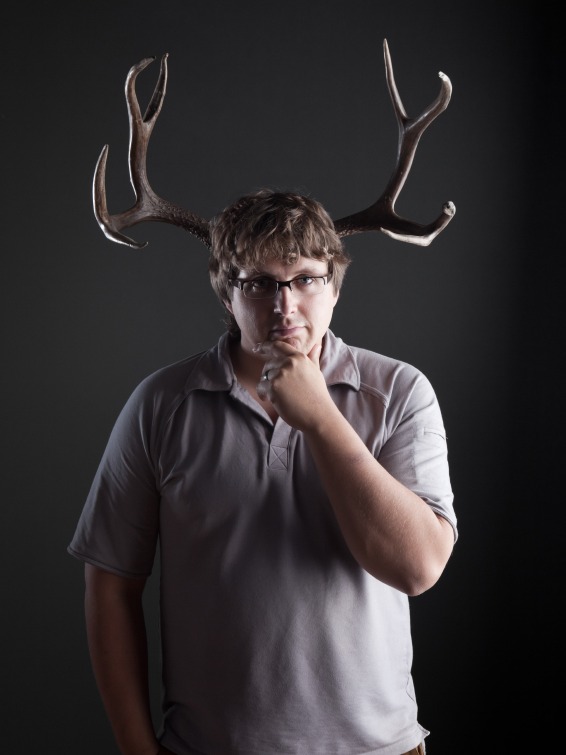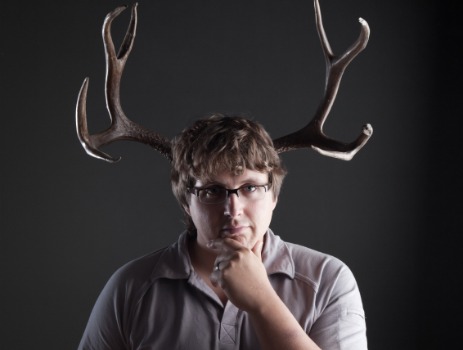 Will we follow the Irish elk’s strange evolutionary path toward extinction?This piece was written by George Black.
Will we follow the Irish elk’s strange evolutionary path toward extinction?This piece was written by George Black.
In my unending (and thus far, I have to confess, largely fruitless) attempts to figure out why Americans aren’t more alarmed about climate change, one of the more intriguing ideas I’ve heard recently was put to me by a psychologist named Andrew Shatté.
Shatté, a professor at the University of Arizona, is best known for his work on resilience — the ability of humans to deal with adversity. His thesis on climate change, in a nutshell, is that we are hardwired for extinction. He compares us to the Irish elk, which went extinct about 11,000 years ago. The male of that species evolved to grow big antlers — I mean really gargantuan antlers, racks up to 12 feet wide, designed for the usual reasons of aggression, defense, and sexual display. Over time, the antlers got so big that the elk couldn’t consume enough calories to sustain their growth, so instead the antlers began to feed in auto-parasitic fashion on the calcium in the animals’ bones. If galloping osteoporosis didn’t kill them, they got their antlers impossibly tangled up in the overhead branches and starved to death.
So why are we like the Irish elk? The problem is the human brain, Shatté says. Our evolutionary development has not yet caught up with the change in our circumstances. More specifically, the problem is our brain’s fear triggers. Our instincts are still paleolithic; our fear reflexes respond to all the wrong things. They lie dormant in the face of climate change, no matter how ominously scientists predict its probable consequences. But we’re programmed to pump adrenalin at the sight of spiders, snakes, and other mortal threats slithering into our caves. We still run a mile from snakes, although they only kill about five or six Americans a year. The most recent annual figure for fatalities from lightning strikes is 58, but would you go anywhere near a golf course in a storm?
For the past year or so, where climate is concerned, our human fear triggers seem to have become even more anesthetized. Some of the reasons seem obvious. The global economic crisis has shunted many other fears into the background, and the climate deniers have done a scarily effective job with all their manufactured “scandals” about the integrity of science.
But wait a second: let’s not generalize about human fear reflexes. What we’re talking about mainly is American reflexes and American deniers. Concern about climate change has diminished almost everywhere in the past year, in inverse proportion to the gravity of the warnings from mainstream scientists. But alarm in the United States remains much lower than in any other developed country. You can argue about the reasons — the enduring belief in American exceptionalism, a cultural distrust of scientists, Rush Limbaugh, whatever. Some people explain the gap by invoking the power of the fossil fuel industry. But in that case, why haven’t the climate skeptics set up shop in Norway, where the oil business accounts for half of the country’s export earnings?
Another common argument — and this is implicit in what Shatté says — is that we aren’t scared by climate change because the threat seems remote and abstract. Bangladeshis may worry about sea-level rise, and Peruvians may fret about melting glaciers, but for Americans, climate change is still something that is happening only in a galaxy far, far away.
I don’t really buy that. I spend a fair amount of time in the West, which is experiencing at least three spectacularly visible impacts of global warming: prolonged drought, raging forest fires, and the destruction of forests by the mountain pine beetle. Sit on your front porch in Wyoming or Idaho and you can almost see the trees dying in front of your eyes — and then hold your breath to see if they will burst into flames come summer. The conundrum, though, is that these states are among the reddest in the country, the most likely to distrust the science on climate change and the most hostile to any government effort to reduce carbon emissions.
So what’s the problem with Americans? (A question that occupies a good amount of bar, pub, and water cooler time in Europe.) In a widely noted comment last October, Eileen Claussen, president of the Pew Center on Global Climate Change, pointed out that while conservative political parties in other countries have small pockets of climate deniers, the United States is the only nation in the developed world where a major political party is almost uniformly hostile to the scientific consensus. There are still a good number of skeptics in the U.K., but none of the three major parties there questions that climate change is a huge problem that demands an urgent response. European conservative leaders like Nicolas Sarkozy in France and Angela Merkel in Germany feel the same way.
All of which brings me back to Andrew Shatté’s theory of evolution. Shatté is a remarkably eloquent guy (his recent TED talk on resilience is worth a look). But in the end I wasn’t convinced. If he’s right about evolution, why are Americans so much less fazed by climate change than the rest of the world? Isn’t evolution supposed to be a uniform process in a species? Or does it happen at different rates depending on your nationality or the accidents of birth? Were the elk in the peat bogs of Killarney more unconcerned about their plight than their cousins in Donegal? However, I suppose in the end debating theories about climate change and evolution depends a lot on whether you believe in evolution in the first place. But let’s not go there. After all, this is America.
This article was syndicated with permission from OnEarth.



